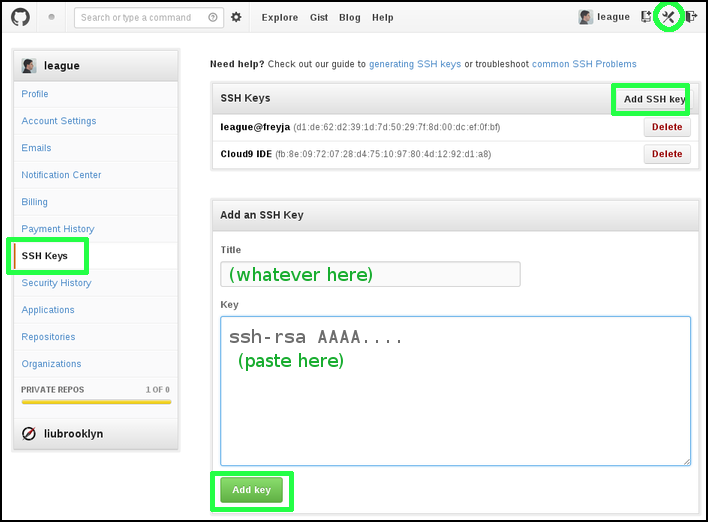This version of GitHub Enterprise will be discontinued on This version of GitHub Enterprise was discontinued on 2019-10-16. No patch releases will be made, even for critical security issues. For better performance, improved security, and new features, upgrade to the latest version of GitHub Enterprise.For help with the upgrade, contact GitHub Enterprise support.
Before you generate an SSH key, you can check to see if you have any existing SSH keys.
Open up PuTTY Key Generator, click 'Generate,' and follow the on-screen instructions Once the key is generated, you will need to save the public key Save it to a location you will be able to easily find it and name it idrsa.pub Now you need to save the private key. How to upload an SSH key via the DreamCompute dashboard; Connect to your DreamCompute Instance with SSH keys in Mac or Linux; How to configure passwordless login in Mac OS X and Linux; Creating and importing a Key pair using the OpenStack CLI; Creating a new Key pair in Windows.
Microsoft Office Professional Plus 2010 Keygen generator + Crack 2020. Microsoft Office Professional Plus 2010 Keygen generator + Crack 2020. Microsoft Office Professional Plus 2010 Keygen generator programs have lots of useful accessibility Attributes that make it much simpler for individuals with disabilities to utilize these products, also also, for many content creators to. Mar 26, 2020 Microsoft office professional plus 2010 product key generator. 7UN9N-34SA1-1SRSJ-983Q0-7PAMP-THP8Q INAKL-64N6P-9Q31T-WUSCQ-VKY9J-BKE95 3JVO0-Z42V8-35QE7-6E6VA-2A936-68QWS LWZWM-606MA-1A7RE-FYWES-U35YS-1XXEZ YJ92L-8JZAQ-DCSV7-10G2C-9HEFY-COEBU. Microsoft office 2010 product key generator and activator (free. Microsoft Office 2010 Professional Plus Product Key or Microsoft Office 365 Product Key is cloud-based, but both can join with Microsoft’s cloud solutions (and to a minimal scope, some third-party providers ). Microsoft office 2010 professional plus serial key generator.
Note: DSA keys were deprecated in OpenSSH 7.0. If your operating system uses OpenSSH, you'll need to use an alternate type of key when setting up SSH, such as an RSA key. For instance, if your operating system is MacOS Sierra, you can set up SSH using an RSA key.
Open TerminalTerminalGit Bashthe terminal.
Enter
ls -al ~/.sshto see if existing SSH keys are present:Check the directory listing to see if you already have a public SSH key.
By default, the filenames of the public keys are one of the following:
- id_dsa.pub
- id_ecdsa.pub
- id_ed25519.pub
- id_rsa.pub
- If you don't have an existing public and private key pair, or don't wish to use any that are available to connect to GitHub, then generate a new SSH key.
- If you see an existing public and private key pair listed (for example id_rsa.pub and id_rsa) that you would like to use to connect to GitHub, you can add your SSH key to the ssh-agent.
Tip: If you receive an error that ~/.ssh doesn't exist, don't worry! We'll create it when we generate a new SSH key.
You generate an SSH key through Mac OS X by using the Terminal application. Once you upload a valid public SSH key,Gerrit can authenticate you based on this key.
Generate Ssh Key Aix
An SSH key consists of a pair of files. One is the private key, which you should never give to anyone. No one will everask you for it and if so, simply ignore them - they are trying to steal it.The other is the public key. When you generate your keys, you will use ssh-keygen to store the keys in a safe locationso you can authenticate with Gerrit.
To generate SSH keys in Mac OS X, follow these steps:
Enter the following command in the Terminal window:
This starts the key generation process. When you execute this command, the ssh-keygen utility prompts you to indicate where to store the key.
Press the
ENTERkey to accept the default location. The ssh-keygen utility prompts you for a passphrase.Type in a passphrase. You can also hit the
ENTERkey to accept the default (no passphrase). However, this is not recommended.
Warning
You will need to enter the passphrase a second time to continue.

After you confirm the passphrase, the system generates the key pair and you will see output like this:
Your private key is saved to the id_rsa file in the .ssh subdirectory of your home directory and is used to verifythe public key you use belongs to your Gerrit account.
Warning
Never share your private key with anyone! Ever! We mean it!
Your public key is saved to a file called id_rsa.pub in the .ssh subdirectory of your home directory. You can copyit to your clipboard using the following command:
Now you can head over to Gerrit, go to settings and paste your public key as described here.
Gerrit is using the special port 29418 instead of the default SSH port 22 which has to be configured accordingly. This can be done in your local ~/.ssh/config file which would contain the following sections then:
How To Generate Ssh Key Mac

How Generate Ssh Key Mac Free
Testing your connection:
